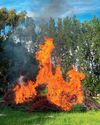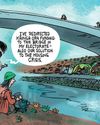試す 金 - 無料
Fangs for the memories
New Zealand Listener
|February 18-24 2023
Compared with other species, humans have childhoods that are unusually long and demanding - especially for parents. And they are getting even longer.

You can find Brenna Hassett described variously online as a bio-archaeologist, biological anthropologist, or an osteo-archaeologist.
"I study the human remains part of the human past," explains Hassett, a researcher at University College London. "The skeletons and particularly the teeth. That falls under something called biological anthropology, but I also do the digging, which is the archaeology." So, a sort of dental amalgam.
Her book Growing Up Human is a millennium-spanning, multifaceted account of how and why we have evolved to have a childhood that is unique among species. And it all comes from looking at old teeth.
"Teeth are essentially a fossil in your mouth," explains Hassett. "A tooth forms once, so it has a series of incredible regular structures, which means we can tell daily episodes of growth while your teeth are forming, which is, of course, childhood."
Fortunately for her research, which clearly runs on molar power, teeth tend to stay around even after other human remains have disappeared. "They capture the chemistry of the growing environment; they capture the stresses and the diseases that kids pick up. They are a brilliant record."
Over the course of human evolution, teeth have changed as what we eat has changed.
"When your teeth come into your mouth is linked to different life history goalposts. When most primates stop breastfeeding, they get that first molar, because they're going to chew food now and they need that to happen. Your second molar comes when you're able to eat all the foods all by yourself. And then you get that third molar[wisdom teeth], the one that gives us humans so much trouble, at sexual maturity."
Drilling down, as it were, Hassett can work out the daily schedule of how animals were growing. It is possible, for instance, to deduce that a two-and-a-half-million-year-old fossil that looks like a 6-year-old's teeth is actually from a 3-year-old.
このストーリーは、New Zealand Listener の February 18-24 2023 版からのものです。
Magzter GOLD を購読すると、厳選された何千ものプレミアム記事や、10,000 以上の雑誌や新聞にアクセスできます。
すでに購読者ですか? サインイン
New Zealand Listener からのその他のストーリー

New Zealand Listener
Down to earth diva
One of the great singers of our time, Joyce DiDonato is set to make her New Zealand debut with Berlioz.
8 mins
29 November-December 5 2025

New Zealand Listener
Tamahori in his own words
Opening credits
5 mins
29 November-December 5 2025

New Zealand Listener
Thought bubbles
Why do chewing gum and doodling help us concentrate?
3 mins
29 November-December 5 2025

New Zealand Listener
The Don
Sir Donald McIntyre, 1934-2025
2 mins
29 November-December 5 2025

New Zealand Listener
I'm a firestarter
Late spring is bonfire season out here in the sticks. It is the time of year when we rural types - even we half-baked, lily-livered ones who have washed up from the city - set fire to enormous piles of dead wood, felled trees and sundry vegetation that have been building up since last summer, or perhaps even the summer before.
2 mins
29 November-December 5 2025

New Zealand Listener
Salary sticks
Most discussions around pay equity involve raising women's wages to the equivalent of men's. But there is an alternative.
3 mins
29 November-December 5 2025

New Zealand Listener
THE NOSE KNOWS
A New Zealand innovation is clearing the air for hayfever sufferers and revolutionising the $30 billion global nasal decongestant market.
2 mins
29 November-December 5 2025

New Zealand Listener
View from the hilltop
A classy Hawke's Bay syrah hits all the right notes to command a high price.
2 mins
29 November-December 5 2025

New Zealand Listener
Speak easy
Much is still unknown about the causes of stuttering but researchers are making progress on its genetic origins.
3 mins
29 November-December 5 2025

New Zealand Listener
Recycling the family silver?
As election year looms, National is looking for ways to pay for its inevitable promises.
4 mins
29 November-December 5 2025
Translate
Change font size

